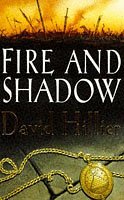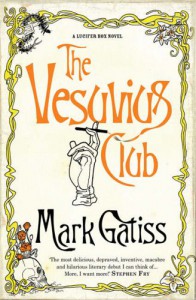Review: ‘The Hammer of the Sun’ by Michael Scott Rohan
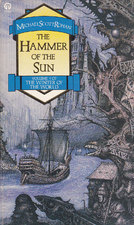 Elof, master smith, and his band of true friends, face their greatest challenge when they confront their nemesis with inferior forces and crippling odds that must not give into a stronger power. (Goodreads Summary)
Elof, master smith, and his band of true friends, face their greatest challenge when they confront their nemesis with inferior forces and crippling odds that must not give into a stronger power. (Goodreads Summary)
I have never before been this disappointed with the final installment in a trilogy. In fact, had it not been the last book of three then I would have given up when it failed to become interesting before page 200, rather than carrying on doggedly until the bitter end out of some bizarre sense of duty as I did. Even after the initial 200 pages of deathly boring sea voyage had been overcome, although the storyline picked up it never became anything particularly different or anything more than a remix of books one and two with a slightly different setting. The ending was perfunctory, out of place and completely unnecessary. It added nothing at all to the narrative and felt like it was tacked on in a vain attempt to make the otherwise pedestrian story seem more spectacular.
This particular edition (the 1988 printing) is riddled with misprints and spelling errors, which made it even more of a chore to read. While I would still reccommend ‘The Anvil of Ice’ and ‘The Forge in the Forest’, I would advise anyone tempted by this trilogy to stop at book two. This book feels like it was simply written to round out the pair of books into a trilogy and adds nothing to a story which is already nicely tied up after the initial two books.
The Hammer of the Sun by Michael Scott Rohan. Published by Orbit, 1988, pp. 509. First edition.
N.B. This is an old review written in 2010 and posted on Goodreads and LibraryThing before I started keeping track of all the books I read here at Old English Rose Reads. I’ve decided to keep copies here so that this remains a complete record of my reading since I started reviewing books for my own pleasure.
Review: ‘A Zoo in My Luggage’ by Gerald Durrell
A Zoo in My Luggage begins with an account of Durrell’s third trip to the British Cameroons in West Africa, during which he and his wife capture animals to start their own zoo. Returning to England with a few additions to their family—Cholmondeley the chimpanzee, Bug-eye the bush baby, and others—they have nowhere to put them as they haven’t yet secured a place for their zoo. Durrell’s account of how he manages his menagerie in all sorts of places throughout England while finding a permanent home for the animals provides as much adventure as capturing them. For animal lovers of all ages, A Zoo in My Luggage is the romping true story of the boy who grew up to make a Noah’s Ark of his own. (Goodreads Summary)
No matter how ‘out of date’ his books may be now, Gerald Durrell remains an absolute pleasure to read. Not only does he have a wealth of fascinating experience from which to draw, he has an excellent eye for detail. His style is dry, amusing, and full of that oh-so-English litotes which is so rarely seen in newer writing. I often found myself laughing out loud at his delightful way of phrasing things.
I did find the constant use of pigdin grated a little. However, this was mostly because it sounded like JarJar Binks, and I can hardly blame Gerald Durrell for something that was George Lucas’ fault some 40 years after he wrote this book. I became used to reading it fairly quickly though, and it soon ceased to actively annoy me.
A Zoo in My Luggage by Gerald Durrell. Published by Penguin, 1970, pp. 191. Originally published in 1960.
N.B. This is an old review written in 2010 and posted on Goodreads and LibraryThing before I started keeping track of all the books I read here at Old English Rose Reads. I’ve decided to keep copies here so that this remains a complete record of my reading since I started reviewing books for my own pleasure.
Review: ‘The Discovery of Chocolate’ by James Runcie
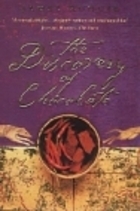 What delicious ingredients James Runcie has blended together in his first novel, The Discovery of Chocolate–a picaresque, time-travelling journey of self-discovery. Told by the Spaniard, Diego de Godoy, accompanied by his faithful greyhound Pedro, Diego wanders the world, like Don Quixote bereft of his Dulcinea, in search of his beloved Ignacia–and the perfect chocolate. (Goodreads Summary)
What delicious ingredients James Runcie has blended together in his first novel, The Discovery of Chocolate–a picaresque, time-travelling journey of self-discovery. Told by the Spaniard, Diego de Godoy, accompanied by his faithful greyhound Pedro, Diego wanders the world, like Don Quixote bereft of his Dulcinea, in search of his beloved Ignacia–and the perfect chocolate. (Goodreads Summary)
This book had an interesting premise but sadly never quite delivered in the writing. A Spanish conquistador falls in love with a Mexican girl, but circumstances drive them apart. When he leaves, she gives him a drink of enchanted chocolate which extends his life and slows his aging to allow him to return to her at a time when they can be together. Consequently, he wanders through time with Pedro, his greyhound companion, in search of chocolate and love. However, far more time and attention is given to the chocolate in this book. The descriptions of chocolate making, baking, experimenting and eating are rich and sensuous and instantly made me hungry. In fact, the food writing is what makes this book interesting to read.
The remainder of the plot does not fare so well. The time travel element, surely an essential part of the plot, was made to seem almost incidental and there was no attempt to make it either logical or consistent. That the main character did not react with any surprise or disorientation to the completely unpredictable passage of time, and so it comes across as a lack of development on the part of the author rather than a deliberate device. The characters were mostly undeveloped, but this bothered me less than I expected as their appearances in the narrative were so fleeting. I did enjoy Diego’s brushes with real historical figures, painfully contrived as they were, but they seemed an incidental rather than integral part of the story. Not enough was made of them, often they were unrelated to either love or chocolate, and so they did not really fit into the rest of the narrative. Ultimately, I suppose it’s difficult to write an interesting account of a man who very rapidly finds his own life uninteresting and repetitive.
The Discovery of Chocolate by James Runcie. Promotional edition free with the Times. Originally published in 2001.
N.B. This is an old review written in 2010 and posted on Goodreads and LibraryThing before I started keeping track of all the books I read here at Old English Rose Reads. I’ve decided to keep copies here so that this remains a complete record of my reading since I started reviewing books for my own pleasure.
Review: ‘Fire and Shadow’ by David Hillier
I also had problems with the main character, in that she was utterly unsympathetic. Now, I don’t read books just because they have ‘nice’ people in them. Some of the best books I’ve read have had characters that I loathe, but find fascinating and interesting nonetheless. Isabel is not such a character. Throughout the book she alternates between whining and whinging at the plight of medieval women and then utterly failing to behave like one as she selfishly pursues her own desires anyway. None of the other characters ever really developed beyond ‘oppressed woman’ or ‘rough warrior with a secret’, so Isabel was my only companion for the whole book, and she was just annoying.
According to the afterword, this novel was developed from some manuscript fragments recounting the real journey of Isabel. I’d love to read these, as such an account would be fascinating and I don’t feel that this book does it justice.
N.B. This is an old review written in 2010 and posted on Goodreads and LibraryThing before I started keeping track of all the books I read here at Old English Rose Reads. I’ve decided to keep copies here so that this remains a complete record of my reading since I started reviewing books for my own pleasure.
Review: ‘The Devil in Amber’ by Mark Gatiss
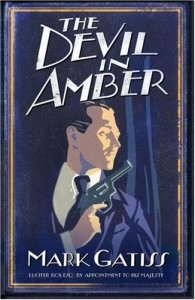 Lucifer Box – portraitist, dandy and terribly good secret agent – is feeling his age. He’s also more than a little anxious about an ambitious younger agent, Percy Flarge, who’s snapping at his heels. Assigned to observe the activities of fascist leader Olympus Mons and his fanatical followers, or “Amber Shirts,” in F.A.U.S.T. – The Fascist Anglo-United States Trinity (an acronym so tortuous it can only be sinister) – in snowbound 1920s New York, Box finds himself framed for a vicious, mysterious murder. Using all of his native cunning, Box escapes aboard a vessel bound for England armed with only a Broadway midget’s suitcase and a string of unanswered questions: What lies hidden in the bleak Norfolk convent of St. Bede? What is “the lamb” that Olympus Mons searches for in his bid for world domination? And what has all this to do with a medieval prayer intended to summon the Devil himself? (Goodreads Summary)
Lucifer Box – portraitist, dandy and terribly good secret agent – is feeling his age. He’s also more than a little anxious about an ambitious younger agent, Percy Flarge, who’s snapping at his heels. Assigned to observe the activities of fascist leader Olympus Mons and his fanatical followers, or “Amber Shirts,” in F.A.U.S.T. – The Fascist Anglo-United States Trinity (an acronym so tortuous it can only be sinister) – in snowbound 1920s New York, Box finds himself framed for a vicious, mysterious murder. Using all of his native cunning, Box escapes aboard a vessel bound for England armed with only a Broadway midget’s suitcase and a string of unanswered questions: What lies hidden in the bleak Norfolk convent of St. Bede? What is “the lamb” that Olympus Mons searches for in his bid for world domination? And what has all this to do with a medieval prayer intended to summon the Devil himself? (Goodreads Summary)
I was hugely disappointed with this book. I enjoyed its predecessor ‘The Vesuvius Club’ so much that I raced through it in a day and went straight onto the second in the series. Unfortunately it suffers by comparison. A lot.
What made the first book such a good read was the dry humour of the narrative style and the characterisation of the delightfully bad Lucifer Box, but both of these key features were decidedly patchy in ‘The Devil in Amber’. It has moments of brilliance (who could fail to be drawn in by the fantastic opening line, ‘He was an American, so it seemed only fair to shoot him’?) but these are well-hidden among standard dross. Mark Gatiss seems to do a lot more telling the reader what was happening than letting us see it coloured through Lucifer’s disdainful perspective. It was like reading a book written to be made into a film rather than read and appreciated as a novel. It remains a fun read, but I sincerely hope that the third installment lives up to the standards of the first book and not the second.
The Devil in Amber by Mark Gatiss. Published by Pocket Books, 2006, pp. 248. Originally published in 2006.
N.B. This is an old review written in 2010 and posted on Goodreads and LibraryThing before I started keeping track of all the books I read here at Old English Rose Reads. I’ve decided to keep copies here so that this remains a complete record of my reading since I started reviewing books for my own pleasure.
Review: ‘The Vesuvius Club’ by Mark Gatiss
Meet Lucifer Box: Equal parts James Bond and Sherlock Holmes, with a twist of Monty Python and a dash of Austin Powers, Lucifer has a charming countenance and rapier wit that make him the guest all hostesses must have. And most do. But few of his conquests know that Lucifer is also His Majesty’s most daring secret agent, at home in both London’s Imperial grandeur and in its underworld of despicable vice. So when Britain’s most prominent scientists begin turning up dead, there is only one man his country can turn to for help. (Goodreads Summary)
I liked everything about this book, from the bizarre but neatly self-contained plot to the delightfully improbable character names. Lucifer Box is an enjoyably depraved anti-hero with the louche, disaffected air of one of Oscar Wilde’s creations. His wry first person narrative style was amusing and easy to read, so I sped through this book in less than a day. The book was missing the final sparkle and wit of Wilde’s writing, but it seems unfair to criticise one author for not being enough like another, and this did not detract from what was a thoroughly entertaining mystery.
The Vesuvius Club by Mark Gatiss. Published by Pocket Books, 2005, pp. 240. Originally published in 2004.
N.B. This is an old review written in 2010 and posted on Goodreads and LibraryThing before I started keeping track of all the books I read here at Old English Rose Reads. I’ve decided to keep copies here so that this remains a complete record of my reading since I started reviewing books for my own pleasure.
Review: ‘Making Cocoa for Kingsley Amis’ by Wendy Cope
 Wendy Cope is very clever. She’s good at taking much of what poetry holds dear and pricking its balloon. Her humour is an acquired taste and one short poem from “Strugnell’s Haiku” sets the tone of this volume, first published in 1986, to great popular acclaim. “The leaves have fallen / And the snow has fallen and / Soon my hair also …” a perfect haiku in form and perfectly ridiculous. This is her raison d’etre, to highlight the absurd in love, sex, courtship and in the sometimes stuffy, self-righteous literary poetry world. (Goodreads Summary)
Wendy Cope is very clever. She’s good at taking much of what poetry holds dear and pricking its balloon. Her humour is an acquired taste and one short poem from “Strugnell’s Haiku” sets the tone of this volume, first published in 1986, to great popular acclaim. “The leaves have fallen / And the snow has fallen and / Soon my hair also …” a perfect haiku in form and perfectly ridiculous. This is her raison d’etre, to highlight the absurd in love, sex, courtship and in the sometimes stuffy, self-righteous literary poetry world. (Goodreads Summary)
This was a wonderful little collection of poems from a delightful poet. I loved the literary parodies and the way she pokes fun at the things people take too seriously. Her use of bathos is just perfect and I often found myself laughing out loud. Although the majority of the poems in this book are humorous they contain kernels of wisdom and grains of truth, and the overall comic tone of the collection makes the few serious poems seem all the more serious by comparison. Definitely not a book to read on the train, although having read Cope’s poem on the subject, I now know that this would be the perfect way to make sure I get a seat.
Making Cocoa for Kingsley Amis by Wendy Cope. Published by Faber and Faber, 1999, pp. 61. Originally published in 1986.
N.B. This is an old review written in 2010 and posted on Goodreads and LibraryThing before I started keeping track of all the books I read here at Old English Rose Reads. I’ve decided to keep copies here so that this remains a complete record of my reading since I started reviewing books for my own pleasure.
Review: ‘The Tales of Beedle the Bard’ by J. K. Rowling
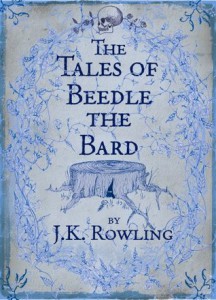 The Tales of Beedle the Bard contains five richly diverse fairy tales, each with its own magical character, that will variously bring delight, laughter and the thrill of mortal peril. Additional notes for each story penned by Professor Albus Dumbledore will be enjoyed by Muggles and wizards alike, as the Professor muses on the morals illuminated by the tales, and reveals snippets of information about life at Hogwarts. (Goodreads Summary)
The Tales of Beedle the Bard contains five richly diverse fairy tales, each with its own magical character, that will variously bring delight, laughter and the thrill of mortal peril. Additional notes for each story penned by Professor Albus Dumbledore will be enjoyed by Muggles and wizards alike, as the Professor muses on the morals illuminated by the tales, and reveals snippets of information about life at Hogwarts. (Goodreads Summary)
This was an enjoyable little book, although it lacked some of the magic which made the Harry Potter books so readable. None of the five stories in this book are particularly original, but that’s because they’re written as though they’re part of a long tradition of gnomic tales which become part of our collective consciousness. They’re written in the simple, unembellished language of folk tale, which is perfectly appropriate but suffers a little from being read rather than heard told. Unfortunately, Rowling does such a good job of writing in this particular style that it’s impossible to tell that the book is written by her. Only in Dumbledore’s textual notes does the voice of the Harry Potter books come alive, and that’s really what was missing for me.
The Tales of Beedle the Bard by J. K. Rowling. Published by Bloomsbury, 2008, pp. 128. Originally published in 2008.
N.B. This is an old review written in 2010 and posted on Goodreads and LibraryThing before I started keeping track of all the books I read here at Old English Rose Reads. I’ve decided to keep copies here so that this remains a complete record of my reading since I started reviewing books for my own pleasure.
Review: ‘La Prisonniere’ by Malika Oufkir
 Malika Oufkir was born into a proud Berber family in 1953, the eldest daughter of the King of Morocco’s closest aide. She was adopted by the king to be a companion to his little daughter, and at the royal court of Rabat, Malika grew up locked away in a golden cage, among the royal wives and concubines. But when Malika was eighteen, in 1972, her father was arrested after an attempt to assassinate the king. General Oufkir was swiftly and summarily executed. Malika, her beautiful mother and her five younger brothers and sisters were seized and thrown into an isolated desert jail. For fifteen years, they had no contact with the outside world, and lived in increasingly barbaric and inhumane conditions. La Prisonnière is a heart-rending account of resilience in the face of extreme deprivation, of the courage and even humour with which one family faced their tormented fate. A shocking true story, it is hard to comprehend that it could have happened in our own times. (Goodreads Summary)
Malika Oufkir was born into a proud Berber family in 1953, the eldest daughter of the King of Morocco’s closest aide. She was adopted by the king to be a companion to his little daughter, and at the royal court of Rabat, Malika grew up locked away in a golden cage, among the royal wives and concubines. But when Malika was eighteen, in 1972, her father was arrested after an attempt to assassinate the king. General Oufkir was swiftly and summarily executed. Malika, her beautiful mother and her five younger brothers and sisters were seized and thrown into an isolated desert jail. For fifteen years, they had no contact with the outside world, and lived in increasingly barbaric and inhumane conditions. La Prisonnière is a heart-rending account of resilience in the face of extreme deprivation, of the courage and even humour with which one family faced their tormented fate. A shocking true story, it is hard to comprehend that it could have happened in our own times. (Goodreads Summary)
Reading this book, it’s hard to believe that the events it chronicles happened less than 50 years ago. The story of Malika and her family is shocking, and rightfully so, but is told in a way which is dignified and matter-of-fact rather than the tabloid style, deliberately provocative narrative it could easily have become. I was amazed at how a book which is essentially the account of twenty years of monotony in jail was never tedious or repetitive. The account was a bit slow to get going and the very straightforward writing style which works so well later on seems a bit dull at first when describing family history and Malika’s earlier opulent existence at court. Of course, this could be due to the translator rather than the author, and this section is short enough that it doesn’t detract too much from the rest of the book.
La Prisonniere by Malika Oufkir and Michele Fitoussi. Published by Corgi, 2001, pp. 397. Originally published in French in 1980.
N.B. This is an old review written in 2010 and posted on Goodreads and LibraryThing before I started keeping track of all the books I read here at Old English Rose Reads. I’ve decided to keep copies here so that this remains a complete record of my reading since I started reviewing books for my own pleasure.
Review: ‘The Silver Pigs’ by Lindsey Davis
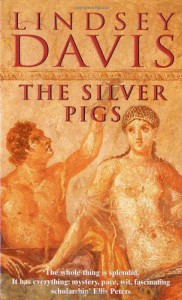 When Marcus Didius Falco, a Roman “informer” who has a nose for trouble that’s sharper than most, encounters Sosia Camillina in the Forum, he senses immediately all is not right with the pretty girl. She confesses to him that she is fleeing for her life, and Falco makes the rash decision to rescue her—a decision he will come to regret. For Sosia bears a heavy burden: as heavy as a pile of stolen Imperial ingots, in fact. Matters just get more complicated when Falco meets Helena Justina, a Senator’s daughter who is connected to the very same traitors he has sworn to expose. Soon Falco finds himself swept from the perilous back alleys of Ancient Rome to the silver mines of distant Britain—and up against a cabal of traitors with blood on their hands and no compunction whatsoever to do away with a snooping plebe like Falco. (Goodreads Summary)
When Marcus Didius Falco, a Roman “informer” who has a nose for trouble that’s sharper than most, encounters Sosia Camillina in the Forum, he senses immediately all is not right with the pretty girl. She confesses to him that she is fleeing for her life, and Falco makes the rash decision to rescue her—a decision he will come to regret. For Sosia bears a heavy burden: as heavy as a pile of stolen Imperial ingots, in fact. Matters just get more complicated when Falco meets Helena Justina, a Senator’s daughter who is connected to the very same traitors he has sworn to expose. Soon Falco finds himself swept from the perilous back alleys of Ancient Rome to the silver mines of distant Britain—and up against a cabal of traitors with blood on their hands and no compunction whatsoever to do away with a snooping plebe like Falco. (Goodreads Summary)
This book felt like the best possible combination of an exciting mystery and a really interesting history lesson. Lindsey Davis has obviously spent a great deal of time and effort researching Rome, the empire and everyday life at the time and it shows. The setting of the book is rich, believable and exactly how I imagine ancient Rome would have been. She also has an useful device of making more knowledgeable characters explain things to less knowledgeable ones, so that details which the reader might not know or understand (such as the process of casting silver pigs) are fully explained without it seeming contrived or out of place. The book managed to walk the delicate line of being educational without being didactic.
I also enjoyed how the author turned all the detective stereotypes around and created a really original character in Falco. Detectives usually have no family: Falco is at the centre of a huge Italian family of chattering women, complete with overbearing mother. They usually have troubled pasts: Falco has a slightly embarrassing one that he’d rather no one mentioned. The list of his interesting characteristics goes on, and his wry observations made him a perfect first person narrator. The other characters in the book are equally well thought out: bold, brash and full of life. I look forward to meeting them again in subsequent books, as I’ll definitely be reading more of this series.
The Silver Pigs by Lindsey Davis. Published by Arrow, 2000, pp. 318. Originally published in 1989.
N.B. This is an old review written in 2010 and posted on Goodreads and LibraryThing before I started keeping track of all the books I read here at Old English Rose Reads. I’ve decided to keep copies here so that this remains a complete record of my reading since I started reviewing books for my own pleasure.

